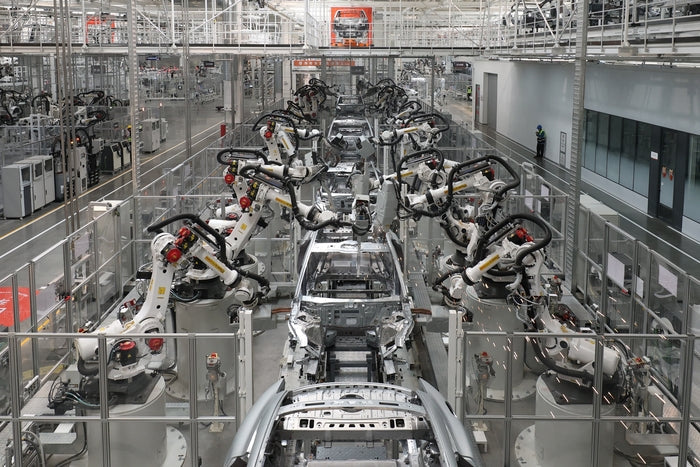
Xiaomi’s EV Factory Hits 91% Automation as Demand Surges
Share

A New Era in Automated Manufacturing
Xiaomi opened its Tongzhou EV plant two years ago.
The site covers an area equal to 100 soccer fields.
The company now operates with 91% automation across production lines.
Over 700 robots perform body assembly tasks with speed and precision.
Robotics Replace Traditional Manual Labor
Visitors recently toured the pristine factory floor in Beijing.
Automated guided vehicles carried components between production zones.
Multiple robotic arms executed complex assembly tasks without human input.
Unlike rivals, Xiaomi eliminated manual door fitting and fine adjustments.
Each vehicle enters a light tunnel for fast quality checks.
Self-driving carriers then transport completed cars across the facility.
Rising Output to Meet EV Demand
Xiaomi launched its first EV, the SU7, in March last year.
Demand quickly pushed the plant to raise production capacity.
The factory now produces over 1,000 cars daily.
Xiaomi delivered 30,000 vehicles in July alone.
Cumulative shipments reached 300,000 within 15 months.
The company aims to scale production to 150,000 units yearly.
At full expansion, output could reach 240,000 units.
YU7 SUV Sparks Record Orders
Xiaomi launched the YU7 SUV in June.
The vehicle drew 240,000 orders within 18 hours.
Customers now face delivery waits exceeding ten months.
Competitors lower prices, yet Xiaomi sustains strong demand.
The YU7’s Porsche-like design attracts a wide audience.
Financial Growth Through EV Success
Xiaomi reported Q2 sales of 116 billion yuan.
This figure marked a 30.5% increase year-over-year.
Net profit jumped 75.4%, hitting 10.8 billion yuan.
Xiaomi’s EV strategy now drives both revenue and market momentum.
Technology Ecosystem Strengthens Appeal
Xiaomi introduced HyperOS 2 for connected experiences.
The system links cars, smartphones, and smart home devices.
This seamless ecosystem continues to attract loyal “Mi Fans.”
R&D and Innovation Investments Grow
Xiaomi raised R&D spending to 24.1 billion yuan last year.
This reflected a 25.9% increase from the prior year.
Over 21,190 employees now focus on research and development.
The company holds 42,000 patents worldwide.
More than 1,000 patents focus on electric vehicle innovation.
